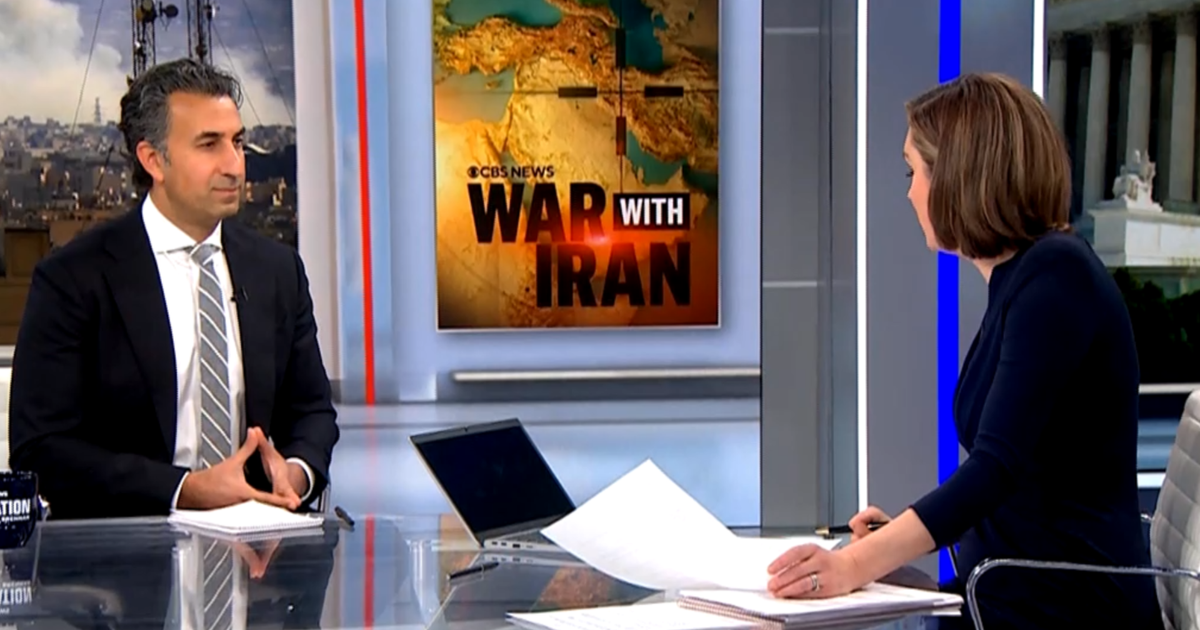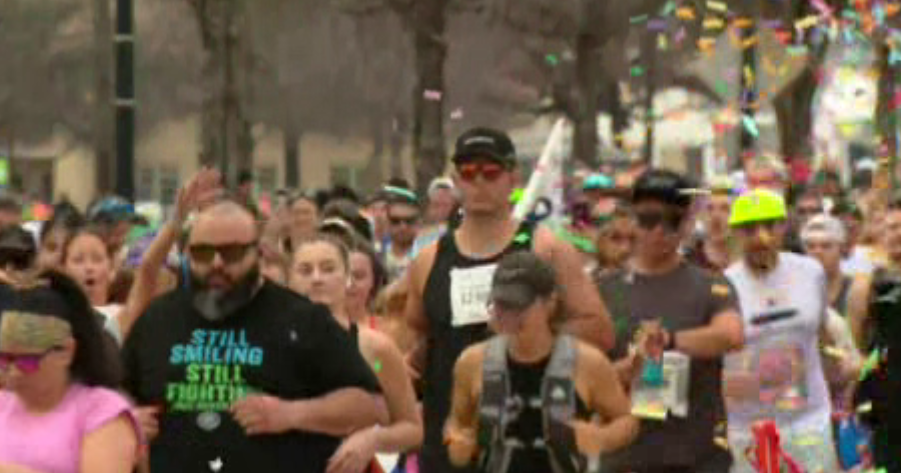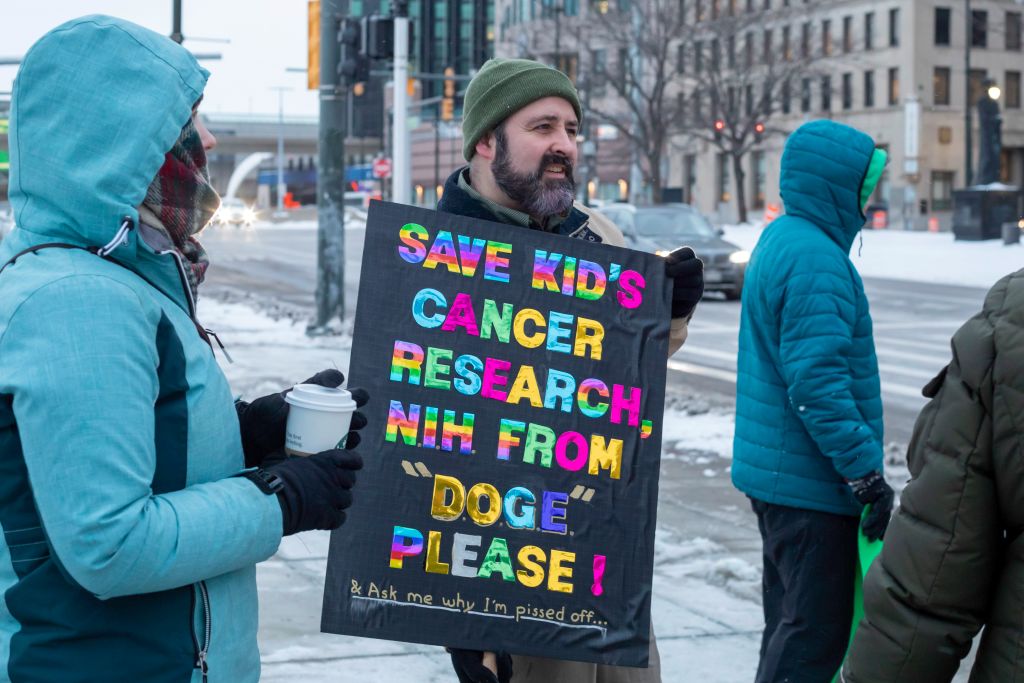Transcript: Dr. Anthony Fauci discusses coronavirus on "Face the Nation," March 15, 2020
The following is a transcript of an interview with Dr. Anthony Fauci that aired Sunday, March 15, 2020, on "Face the Nation."
MARGARET BRENNAN: And we've just learned that the UK is now advising against non-essential travel to the US. We turn now to Dr. Anthony Fauci, director of the National Institute of Allergy and Infectious Diseases at NIH. Dr. Fauci, thank you for making time. I know you're quite busy. You said this week we are not at the peak.
DR. ANTHONY FAUCI: Right.
MARGARET BRENNAN: And this is going to get worse. How much worse?
DR. FAUCI: Yeah.
MARGARET BRENNAN: What are the numbers?
DR FAUCI: Well, I can't give you numbers because it's really going to depend on the effectiveness of our response, and our response- I mean, if you just leave the virus to its own devices, it will go way up like we've seen in Italy. That's not going to happen if we do what we're attempting to do and are doing. And that's--
MARGARET BRENNAN: How do we get ahead of it?
DR. FAUCI: Well, the way you get ahead of it is that as - as I try to explain to people, that I want people to assume that I'm over- or that we are overreacting, because if it looks like you're overreacting, you're probably doing the right thing, because we know from China, from South Korea, from Italy, that what the virus does, it goes- percolates along and then it takes off. So what we've got to do is a couple of things, and we're doing it. One is preventing new infections from coming in, hence the travel restriction. And the other is doing containment and mitigation within the country. And it is correct that the infections are going to go up. Our job is to make sure it doesn't do the maximum peak and actually blunts. Within that blunt there will be many new infections. We want to make sure we don't get to that really bad peak.
MARGARET BRENNAN: And American's lives have changed dramatically—
DR. FAUCI: Right.
MARGARET BRENNAN: --in the week we just went through and they're going to continue to change. People aren't supposed to be visiting nursing homes.
DR. FAUCI: Right.
MARGARET BRENNAN: People are being told to work from home. Schools are shutting down.
DR. FAUCI: Right.
MARGARET BRENNAN: Give us the reality check, though. What is the mortality rate and what is the recovery rate?
DR. FAUCI: Right, well, the issue is, if you look historically right now in the United States, we're collecting data, looks similar to what we've seen in some other places. If you look at the totality, China dominated that previously, the mortality was about three percent. Okay? That's quite high for any kind of respiratory disease. If you look at the other countries, it's somewhat less. If you count all the people who are getting infected and are not being counted because they're not coming to the attention of a healthcare provider, then mortality will likely come down to somewhere around one percent or less. But even that is serious. And that's why we've got to take this seriously, because if you look at the typical seasonal flu, it's 0.1 percent. So this is a virus that transmits readily. It's a virus that has a high degree of morbidity and mortality. And that's the reason we've got to do all of our forces. Now, if you look at the recovery rate, the recovery rate is minus what the mortality is. So if- if the mortality is one percent, it's 99 percent recovery rate. If the mortality is even less, overwhelmingly more people recover from this than get into serious trouble. There's no doubt about that. But we want to make sure that we not only decrease the rate of infection, we protect the vulnerable people who are within that percentage that have a much higher degree of morbidity and mortality.
MARGARET BRENNAN: The president indicated that he is looking at travel restrictions, including--
DR. FAUCI: Right- right.
MARGARET BRENNAN: --within the country. Should Americans get on a plane right now?
DR. FAUCI: Well, it depends on what the reason for getting on the plane. Anything that's to my mind, particularly if you are a person who's elderly or who falls within the category of underlying conditions, you should really think twice before putting yourself in a situation where you're in a crowded place for an extended period of time.
MARGARET BRENNAN: You wouldn't get on a plane?
DR. FAUCI: Right now. Me? For- there are a number of reasons why I wouldn't get on a plane, but if I were not doing the job that I'm doing because of my age, I would very seriously think about not doing any travel like that.
MARGARET BRENNAN: Should Americans get up and go to the office tomorrow?
DR. FAUCI: Well, you know, it depends on the situation that you're in. To the extent possible, teleworking should be done to the extent that you could do it. I mean, there are some jobs you can't telework. Let's be real. But if you can, you should. You should avoid crowded places. And then that's the things that we've been talking about all along right now. The CDC has a nice website. You go in, you talk about the different kinds of mitigations at different levels of involvement.
MARGARET BRENNAN: Don't go to crowded places. France is trying to close down restaurants--
DR. FAUCI: Right.
MARGARET BRENNAN: --and cafes, and bars.
DR. FAUCI: Exactly. Yeah.
MARGARET BRENNAN: Should that happen here in the United States?
DR. FAUCI: You know, every single day we meet with the task force, and we take a look at what's going on. And you don't want to make a pronouncement that no one should ever go into a restaurant. I mean, I think that might be overkill right now, but everything is on the table. It may come to the situation where we strongly recommend. Right now, myself personally, I wouldn't go to a restaurant. I just wouldn't because I don't want to be in a crowded place. I have an important job to do. I don't want to be in a situation where I'm going to be all of a sudden self-isolating for 14 days.
MARGARET BRENNAN: For those Americans who are now returning from Europe, how do we make sure that that doesn't allow for further spread?
DR. FAUCI: Yeah.
MARGARET BRENNAN: How do you screen them?
DR. FAUCI: You know, I think the issue is if you look at what's happening now for people who are coming back from- like the European countries, when they get back in here, they're having en- enhanced screening when they come back.
MARGARET BRENNAN: What does that mean? Taking their temperature?
DR. FAUCI: Well, no, actually, just looking at them, seeing if they're sick, giving them a piece of paper. Here's a telephone number. Here's what you need to watch out for. Watch out for these symptoms. And importantly 14 days of self-isolation if you come from one of those countries that are on that list.
MARGARET BRENNAN: Period?
DR. FAUCI: Period. You come back,14 day of voluntary self-isolation.
MARGARET BRENNAN: Now, the federal government could invoke authorities to do things like quarantine--
DR. FAUCI: Right.
MARGARET BRENNAN: --for places that are hotspots like New Rochelle,--
DR. FAUCI: Right.
MARGARET BRENNAN:--like Seattle.
DR. FAUCI: Right.
MARGARET BRENNAN: Would you like to see that?
DR. FAUCI: Well, it depends on the individual circumstance. The problem, MARGARET, with my making a pronouncement what should be done, you've got to look at what the situation is at the local level. I mean, for example, in New York City, in- in New Rochelle, it's a very difficult situation up there. So Governor Cuomo made some important decisions, which in my mind, looking at what he did, were the right decisions.
MARGARET BRENNAN: The American College of Surgeons has told hospitals that they need to prepare to cancel particularly elective surgeries.
DR. FAUCI: Right, right.
MARGARET BRENNAN: That implies that hospitals are about to get overwhelmed.
DR. FAUCI: Right. Yeah.
MARGARET BRENNAN: Do we have the hospital capacity to deal with what is coming?
DR. FAUCI: Right.
MARGARET BRENNAN: And if we don't, what is the plan?
DR. FAUCI: Okay--
MARGARET BRENNAN: Is it to use military hospitals?
DR. FAUCI: Well- well, first of all, again, you've got to look at what the- the bracket is of the possibility. If in a worst case scenario, and I don't want to scare people, that you always got to consider. There's a worst case scenario. There's a best case scenario and there's something in the middle. We're doing everything we can to not allow that worst case scenario to happen. If it happens, which I don't think it will, because I- I can see the effort that we're putting in--
MARGARET BRENNAN: You don't think hospitals will be overwhelmed?
DR. FAUCI: No- no, I don't say that. I say it's possible that they could be. But when you say that people get frightened, but concentrate on what you can do to not make that happen. But if, in fact, there's a scenario that's very severe, it is conceivable that will happen. And that's the reason why you have things like the strategic national stockpile for- for ventilators and things like that.
MARGARET BRENNAN: There's concern about shortages of key supplies like that, ventilators--
DR. FAUCI: We- we--
MARGARET BRENNAN: --cotton swabs.
DR. FAUCI: MARGARET, we would be unrealistic if we were not concerned that that possibility exists. What we need to do is to--
MARGARET BRENNAN: But can you reassure the public that there is planning for those eventualities--
DR. FAUCI: There is absolutely--
MARGARET BRENNAN: --I know you're saying it's the worst case.
DR. FAUCI: --planning. There's absolute, 100 percent take that to the bank. There's planning to address that, but we would be unrealistic to not pay attention to the possibility that it could happen.
MARGARET BRENNAN: So millions of children across this country are looking at the possibility of not being able to go to school for at least a few weeks--
DR. FAUCI: Right.
MARGARET BRENNAN: --possibly longer.
DR. FAUCI: Right.
MARGARET BRENNAN: Their parents are going to try to figure out what to do with them.
DR. FAUCI: Right- right.
MARGARET BRENNAN: Can they take them to playgrounds? Is that safe?
DR. FAUCI: Well, you know, it depends. If you have a bunch of kids in the playground, I don't think it's a good idea to congregate anybody anywhere to the extent that you--
MARGARET BRENNAN: Of any age, period?
DR. FAUCI: Yes, of course. Yes.
MARGARET BRENNAN: Because there is that perception that if you're younger--
DR. FAUCI: No--
MARGARET BRENNAN: --you're not as--
DR. FAUCI: Well--
MARGARET BRENNAN:--at risk.
FAUCI: Yes, indeed, but if a- if a young individual, a child, gets infected, they may do perfectly well from a physical standpoint, but they may bring it home to a person who is susceptible. So we can't discount the- the issue of children need also to follow certain of these rules.
MARGARET BRENNAN: So if I were standing next to someone who was later diagnosed with the coronavirus,--
DR. FAUCI: Right.
MARGARET BRENNAN: --what do I do? Do I have to wait until I'm exhibiting symptoms, actually ill--
DR. FAUCI: Yeah.
MARGARET BRENNAN: --before I can get a test?
DR. FAUCI: No. Right now, if you feel- if you are in a high risk situation, and remember just being in the room, you know, six feet apart or whatever from someone--
MARGARET BRENNAN: Sitting having dinner?
DR. FAUCI: Yeah--
MARGARET BRENNAN: Shaking hands?
DR. FAUCI: Well, see, dinner is different. It depends. If you're having dinner for multiple hours with someone who has symptoms and finds out that that person is sick, that puts you at a higher risk. That's something that you really need to essentially hunker down, get a physician, call them up, get instructions of what to do. If you walk into a room and you find out three days later that somebody in that room was infected and was asymptomatic when they were infected. Your risk is very low, very low.
MARGARET BRENNAN: And in the circumstance, I need that test--
DR. FAUCI: Right.
MARGARET BRENNAN: When will it be available? I know you've made the point. It's not just shipping them out it's getting them operational.
DR. FAUCI: Exactly.
MARGARET BRENNAN: How long before that happens?
DR. FAUCI: You know, I would hope, based on what we've heard from the CEOs of the companies that are now getting involved, that they're going to be getting those tests out there in an easy way, not only to be out there, but to actually get them quite soon. They're talking within a several days to a week to start to see it rev up.
MARGARET BRENNAN: So that means testing within several days or a week?
DR. FAUCI: Right. But that doesn't mean you're going to be maximum because nothing goes from zero to maximum. So if the companies are going to get involved, the laboratory groups that do this for a living, when they get involved, it's going to go like this so that you're going to start seeing tests more and more available until pretty soon they're gonna be quite available. But in the next day or so, you're going to find people are going to say, you know, I wanted to get a test and I couldn't get it. That's gonna happen. But the future, as opposed to looking back the future is going to be like this as opposed to the inhibitions we've seen before.
MARGARET BRENNAN: Several days or a week?
DR. FAUCI: You know, again--
MARGARET BRENNAN: That's your time frame?
DR. FAUCI: -- the problem with the pinning down the days--
MARGARET BRENNAN: Right.
DR. FAUCI: -- It's gonna be gotcha if you don't have it.
MARGARET BRENNAN: Well, no we- we- we hear from a lot of viewers on Twitter and elsewhere saying they're concerned about being able to get this.
DR. FAUCI: And they should be concerned. But what we can say that now that we have the private sector involved, we're going to see an entirely different scene than we've seen the weeks previously for sure.
MARGARET BRENNAN: Dr. Fauci, thank you for your time.
DR. FAUCI Good to be with you.
MARGARET BRENNAN: And we will be back in a moment with Dr. Scott Gottlieb. Stay with us.



